
Click one of these guide words to quick jump to our related resources!
Anger Management | Behavior Management | Bully Prevention | Character Education | Classroom Management | Conflict Resolution | Dealing with Difficult Feelings | Divorce & Family | Drug Prevention | Life Skills | Loss & Grief | Parenting | Self-Esteem | Social Skills | Special Needs | Sexual Abuse | Teenage Years |
 Actions and Consequences for Teens
Actions and Consequences for Teens
 Anger Alert!
Anger Alert!
 The Anger Control Game
The Anger Control Game
 Anger IQ
Anger IQ
 Anger Management Speedway
Anger Management Speedway
 The Anger Solution Board Game
The Anger Solution Board Game
 Angry Animals 2
Angry Animals 2
 Any Game Cards
Any Game Cards
 Better Builders Emotions
Better Builders Emotions
 The Coping Game
The Coping Game
 Coping Skills For Kids Card Game
Coping Skills For Kids Card Game
 Escape from Anger Island
Escape from Anger Island
 Exploring My Anger
Exploring My Anger
 From Rage to Reason
From Rage to Reason
 I Feel Angry When . . .
I Feel Angry When . . .
 Original Tangle Therapy
Original Tangle Therapy
 Original Tangle With Texture XL
Original Tangle With Texture XL
 Photo Feelings Fun Deck
Photo Feelings Fun Deck
 Problem Solving Photo Scenes
Problem Solving Photo Scenes
 The Self-Control Patrol Game
The Self-Control Patrol Game
 Smart Sharks Card Game - Take a Chomp Out of Anger!
Smart Sharks Card Game - Take a Chomp Out of Anger!
 Social-Emotional Photo Library
Social-Emotional Photo Library
 Stop, Relax & Think Board Game
Stop, Relax & Think Board Game
 Stop the Drama Thumball
Stop the Drama Thumball
 Talking, Feeling, Doing Card Game: Anger
Talking, Feeling, Doing Card Game: Anger
 Talk It Out
Talk It Out
 Tangle Jr. Fuzzies Set of Two
Tangle Jr. Fuzzies Set of Two
 Tangle Jr. Textured Set of Two
Tangle Jr. Textured Set of Two
 Tangle Matrix Ball
Tangle Matrix Ball
 Toss and Learn: Roll for Control
Toss and Learn: Roll for Control
 Toss and Learn: Toss Your Anger
Toss and Learn: Toss Your Anger
 Use Your I's
Use Your I's
 CBT 123
CBT 123
 Find Your Feelings Emotion Slider
Find Your Feelings Emotion Slider
 Calm Down Cubes
Calm Down Cubes
 Emotion-oes Board Game
Emotion-oes Board Game
 Feelings Fair
Feelings Fair
 Furious Fred
Furious Fred
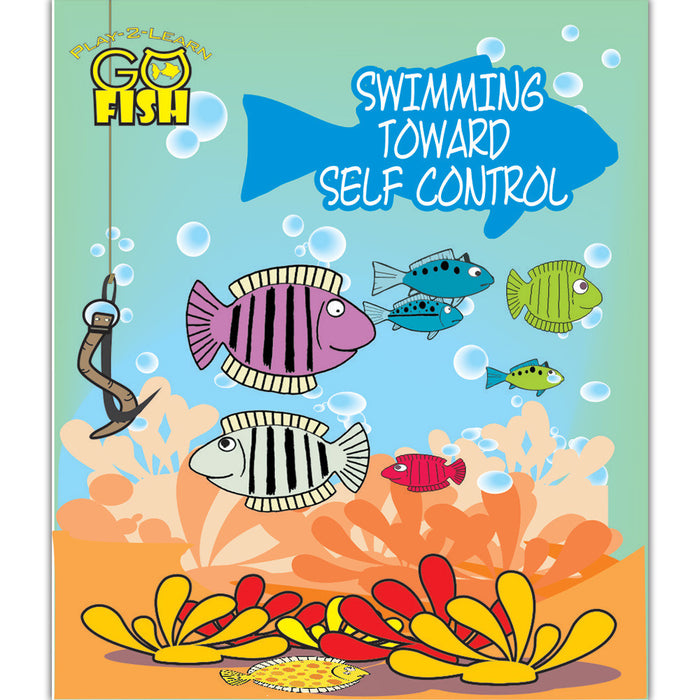 Play-2-Learn: Swimming Towards Self-Control
Play-2-Learn: Swimming Towards Self-Control
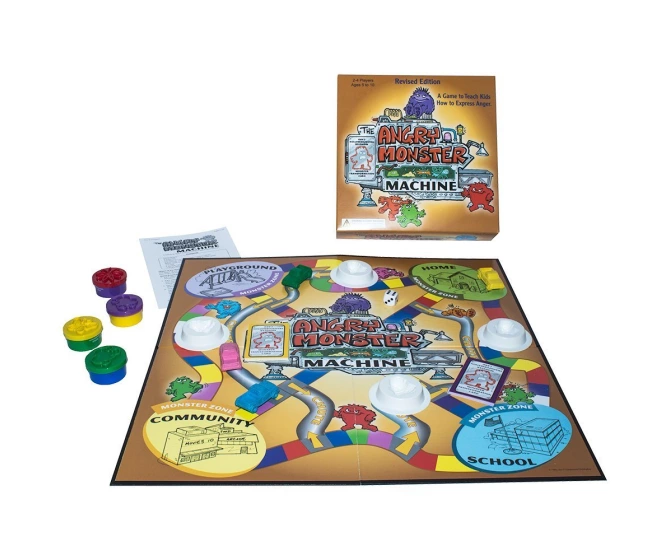 The Angery Monster Machine
The Angery Monster Machine
 Blunders
Blunders
 The Classroom Behavior Game
The Classroom Behavior Game
 The Conduct Management Game
The Conduct Management Game
 Consequences Board Game
Consequences Board Game
 Dr. PlayWell's Best Behavior Game
Dr. PlayWell's Best Behavior Game
 Dr. Playwell's Coping with Stress Card Game
Dr. Playwell's Coping with Stress Card Game
 Dr. PlayWell's Think Positive Board Game
Dr. PlayWell's Think Positive Board Game
 Emotional Bingo for Teens
Emotional Bingo for Teens
 Empathy Counts
Empathy Counts
 Focus on Manners! Fun Deck
Focus on Manners! Fun Deck
 From Rage to Reason
From Rage to Reason
 The Helping, Sharing, and Caring Game
The Helping, Sharing, and Caring Game
 Photo Social Stories: Kids in School
Photo Social Stories: Kids in School
 The Social Conflict Game
The Social Conflict Game
 Social Skills: Boxed set of 6 Board Games
Social Skills: Boxed set of 6 Board Games
 The Self-Control Game
The Self-Control Game
 The Talking, Feeling, & Doing Good Behavior Card Game
The Talking, Feeling, & Doing Good Behavior Card Game
 Wait & Win
Wait & Win
 WHODUNIT
WHODUNIT
 Too Close, Too Far, Just Right
Too Close, Too Far, Just Right
 FOCUS
FOCUS
 Anger Alert!
Anger Alert!
 Anger Management Speedway
Anger Management Speedway
 Emotional Bingo for Children
Emotional Bingo for Children
 Problem Solving Photo Scenes
Problem Solving Photo Scenes
 Stop, Relax & Think Board Game
Stop, Relax & Think Board Game
 Treasure Chest of Group Activities
Treasure Chest of Group Activities
 Wait and Win!
Wait and Win!
 Social-Emotional Photo Library
Social-Emotional Photo Library
 Coping Skills For Kids Card Game
Coping Skills For Kids Card Game
 Talk About It! Teen Communication Game
Talk About It! Teen Communication Game
 Anger IQ
Anger IQ
 The Emotional Intelligence Game
The Emotional Intelligence Game
 Toss and Learn: Roll for Control
Toss and Learn: Roll for Control
 Toss and Learn: Toss Your Anger
Toss and Learn: Toss Your Anger
 CBT 123
CBT 123
 Stress Reduction Card Deck
Stress Reduction Card Deck
 Find Your Feelings Emotion Slider
Find Your Feelings Emotion Slider
 Calm Down Cubes
Calm Down Cubes
 Emotion-oes Board Game
Emotion-oes Board Game
 Feelings Fair
Feelings Fair
 Furious Fred
Furious Fred
 Big Feelings Nesting Fruit Friends
Big Feelings Nesting Fruit Friends
 Grab & play social-emotional game: Building empathy
Grab & play social-emotional game: Building empathy
 Big feelings pineapple Deluxe set
Big feelings pineapple Deluxe set
 Rainbow Emotions Fidget Poppers
Rainbow Emotions Fidget Poppers
 Express your feelings sensory bottles - Opposites
Express your feelings sensory bottles - Opposites
 Any Game Cards
Any Game Cards
 Bullies to Buddies
Bullies to Buddies
 Bullies, Victims & Bystanders
Bullies, Victims & Bystanders
 Bully Busters
Bully Busters
 Bully Free Card Game
Bully Free Card Game
 Bully Wise
Bully Wise
 The Bullying Game
The Bullying Game
 Circle of Friends
Circle of Friends
 Cyber Safe
Cyber Safe
 Dr. Playwells Don't Pick on Me
Dr. Playwells Don't Pick on Me
 How to Be a Bully! NOT!
How to Be a Bully! NOT!
 Rachel's Challenge Game
Rachel's Challenge Game
 She Said What About Me? Card Game
She Said What About Me? Card Game
 Sticks and Stones
Sticks and Stones
 Stop Being So Mean! Board Game
Stop Being So Mean! Board Game
 Stop Bullying Thumball
Stop Bullying Thumball
 The Talking, Feeling, & Doing Teasing Card Game
The Talking, Feeling, & Doing Teasing Card Game
 Problem Solving Photo Scenes
Problem Solving Photo Scenes
 Talk About It! Teen Communication Game
Talk About It! Teen Communication Game
 Toss and Learn: Stand Against Bullying
Toss and Learn: Stand Against Bullying
 Toss and Learn: Give Everyone a Fair Shake
Toss and Learn: Give Everyone a Fair Shake
 Feelings Fair
Feelings Fair
 Furious Fred
Furious Fred
 Any Game Cards
Any Game Cards
 Equipped for Life Game
Equipped for Life Game
 Focus on Manners! Fun Deck
Focus on Manners! Fun Deck
 From Rage to Reason
From Rage to Reason
 Leadership: it's not a game for guppies
Leadership: it's not a game for guppies
 Polite Pigs
Polite Pigs
 The Question Challenge Card Game
The Question Challenge Card Game
 Social Skills: Boxed set of 6 Board Games
Social Skills: Boxed set of 6 Board Games
 The Ungame: the game with a thousand answers
The Ungame: the game with a thousand answers
 What Do You Stand For? Character Building Card Game
What Do You Stand For? Character Building Card Game
 You And Me
You And Me
 Actions and Consequences for Teens
Actions and Consequences for Teens
 Treasure Chest of Group Activities
Treasure Chest of Group Activities
 Social-Emotional Photo Library
Social-Emotional Photo Library
 Toss and Learn: Give Everyone a Fair Shake
Toss and Learn: Give Everyone a Fair Shake
 Totem - The Feel Good Game
Totem - The Feel Good Game
 CBT 123
CBT 123
 Furious Fred
Furious Fred
 Good Citizenship Conversation Cards
Good Citizenship Conversation Cards
 Play-2-Learn: Fishing for Feelings
Play-2-Learn: Fishing for Feelings
 The Classroom Behavior Game
The Classroom Behavior Game
 Common Ties
Common Ties
 Dr. PlayWell's Learning Self Control in School
Dr. PlayWell's Learning Self Control in School
 Journey to Friendsville
Journey to Friendsville
 Original Tangle Therapy
Original Tangle Therapy
 Original Tangle With Texture XL
Original Tangle With Texture XL
 Photo Social Stories: Kids in School
Photo Social Stories: Kids in School
 Tangle Jr. Fuzzies set of Two
Tangle Jr. Fuzzies set of Two
 Tangle Jr. Textured Set of Two
Tangle Jr. Textured Set of Two
 The Self-Control Game
The Self-Control Game
 What Do You Say... What Do You Do... At School?
What Do You Say... What Do You Do... At School?
 Who Are You? Thumball
Who Are You? Thumball
 FOCUS
FOCUS
 This or That Game: Quick Get To Know You
This or That Game: Quick Get To Know You
 Anger Alert!
Anger Alert!
 Clever Catch Ball - Life Skills Intermediate
Clever Catch Ball - Life Skills Intermediate
 Clever Catch Ball - Life Skills Primary
Clever Catch Ball - Life Skills Primary
 Magnetic School Room
Magnetic School Room
 Problem Solving Photo Scenes
Problem Solving Photo Scenes
 Treasure Chest of Group Activities
Treasure Chest of Group Activities
 Coping Skills For Kids Card Game
Coping Skills For Kids Card Game
 Talk About It! Teen Communication Game
Talk About It! Teen Communication Game
 Toss and Learn: Stand Against Bullying
Toss and Learn: Stand Against Bullying
 Toss and Learn: Give Everyone a Fair Shake
Toss and Learn: Give Everyone a Fair Shake
 Calm Down Cubes
Calm Down Cubes
 Furious Fred
Furious Fred
 New Fish in School: Play-2-Learn
New Fish in School: Play-2-Learn
 The Anger Control Game
The Anger Control Game
 The Art of the Deal
The Art of the Deal
 Boundaries Baseball Game
Boundaries Baseball Game
 Feeleez Empathy Game
Feeleez Empathy Game
 From Rage to Reason
From Rage to Reason
 Journey to Friendsville
Journey to Friendsville
 Peacetown: A Conflict Resolution Game
Peacetown: A Conflict Resolution Game
 Problem-Solving Photo Scenes
Problem-Solving Photo Scenes
 Rachel's Challenge Game
Rachel's Challenge Game
 The Self-Control Patrol Game
The Self-Control Patrol Game
 She Said What About Me? Card Game
She Said What About Me? Card Game
 Stop Being So Mean! Board Game
Stop Being So Mean! Board Game
 Who's Responsible?
Who's Responsible?
 Too Close, Too Far, Just Right
Too Close, Too Far, Just Right
 Actions and Consequences for Teens
Actions and Consequences for Teens
 Kids Can! Resolve A Conflict
Kids Can! Resolve A Conflict
 Problem Solving Photo Scenes
Problem Solving Photo Scenes
 Mix and Match Magnetic Families
Mix and Match Magnetic Families
 Coping Skills For Kids Card Game
Coping Skills For Kids Card Game
 Talk About It! Teen Communication Game
Talk About It! Teen Communication Game
 Anger IQ
Anger IQ
 Toss and Learn: Roll for Control
Toss and Learn: Roll for Control
 Toss and Learn: Stand Against Bullying
Toss and Learn: Stand Against Bullying
 Toss and Learn: Roll and Resolve
Toss and Learn: Roll and Resolve
 Toss and Learn: Toss Your Anger
Toss and Learn: Toss Your Anger
 Toss and Learn: Give Everyone a Fair Shake
Toss and Learn: Give Everyone a Fair Shake
 Totem - The Feel Good Game
Totem - The Feel Good Game
 The talking, feeling, and doing game: conflict resolution
The talking, feeling, and doing game: conflict resolution
 Play-2-Learn: Cast Away Conflict
Play-2-Learn: Cast Away Conflict
 The Anger Control Game
The Anger Control Game
 Any Game Cards
Any Game Cards
 Between You & Me
Between You & Me
 Dr. Playwell's Dont Stress Game
Dr. Playwell's Dont Stress Game
 Dr. Playwell's Worry Less Game
Dr. Playwell's Worry Less Game
 Emotes Rescue Quest
Emotes Rescue Quest
 Emotion Blow-Up Balls
Emotion Blow-Up Balls
 Emotions: vocabulary, speaking, & listening activity cards
Emotions: vocabulary, speaking, & listening activity cards
 Escape from Anger Island
Escape from Anger Island
 Expressionary!
Expressionary!
 Feeleez Empathy Game
Feeleez Empathy Game
 Feelings Detective
Feelings Detective
 The Feelings Game
The Feelings Game
 The Feelings Wheel Game
The Feelings Wheel Game
 Healing Games Game Book
Healing Games Game Book
 How Would You Feel Fun Deck
How Would You Feel Fun Deck
 Imagine
Imagine
 Let's Get Talking
Let's Get Talking
 Original Tangle Therapy
Original Tangle Therapy
 Original Tangle With Texture XL
Original Tangle With Texture XL
 Photo Feelings Fun Deck
Photo Feelings Fun Deck
 The Storytelling Game
The Storytelling Game
 Stress Can Mess with You… So Can Bigger Sharks!
Stress Can Mess with You… So Can Bigger Sharks!
 The Stress Management Game
The Stress Management Game
 Talking Tools: a Collection of Ten Counseling Games
Talking Tools: a Collection of Ten Counseling Games
 Tangle Jr. Fuzzies Set of Two
Tangle Jr. Fuzzies Set of Two
 Tangle Jr. Textured Set of Two
Tangle Jr. Textured Set of Two
 Tangle Matrix Ball
Tangle Matrix Ball
 The Talking, Feeling, & Doing Good Behavior Card Game
The Talking, Feeling, & Doing Good Behavior Card Game
 The Talking, Feeling, and Doing Game
The Talking, Feeling, and Doing Game
 Thumballs: Emotions Mania
Thumballs: Emotions Mania
 Use Your I's
Use Your I's
 Anger Alert!
Anger Alert!
 Better Builders Emotions
Better Builders Emotions
 Anger Management Speedway
Anger Management Speedway
 Thumball: Empathy
Thumball: Empathy
 Let's Talk Coloring Books
Let's Talk Coloring Books
 Recovery the Board Game
Recovery the Board Game
 Social-Emotional Photo Library
Social-Emotional Photo Library
 Coping Skills For Kids Card Game
Coping Skills For Kids Card Game
 Anger IQ
Anger IQ
 Toss and Learn: Roll for Control
Toss and Learn: Roll for Control
 Toss and Learn: Toss Your Anger
Toss and Learn: Toss Your Anger
 CBT 123
CBT 123
 Stress Reduction Card Deck
Stress Reduction Card Deck
 Find Your Feelings Emotion Slider
Find Your Feelings Emotion Slider
 Calm Down Cubes
Calm Down Cubes
 Emotion-oes Board Game
Emotion-oes Board Game
 Feelings Fair
Feelings Fair
 Furious Fred
Furious Fred
 Don't Go Bananas: Emotional Control Game for Kids
Don't Go Bananas: Emotional Control Game for Kids
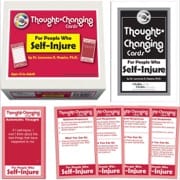 Thought-Changing Cards for People who self-injure
Thought-Changing Cards for People who self-injure
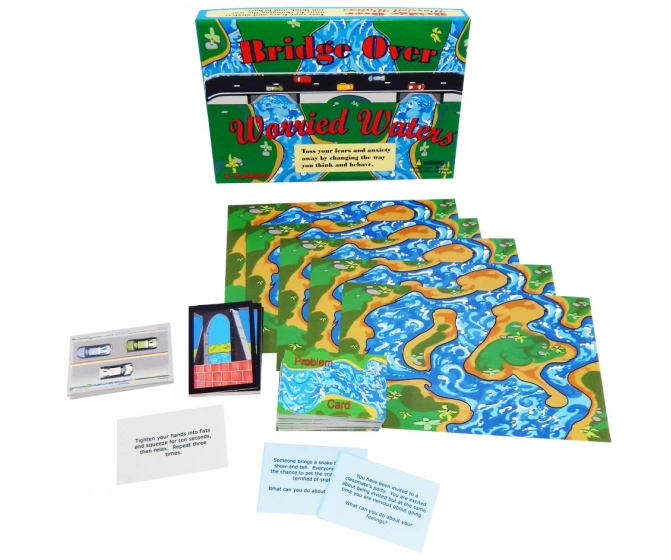 Bridge over Worried Waters
Bridge over Worried Waters
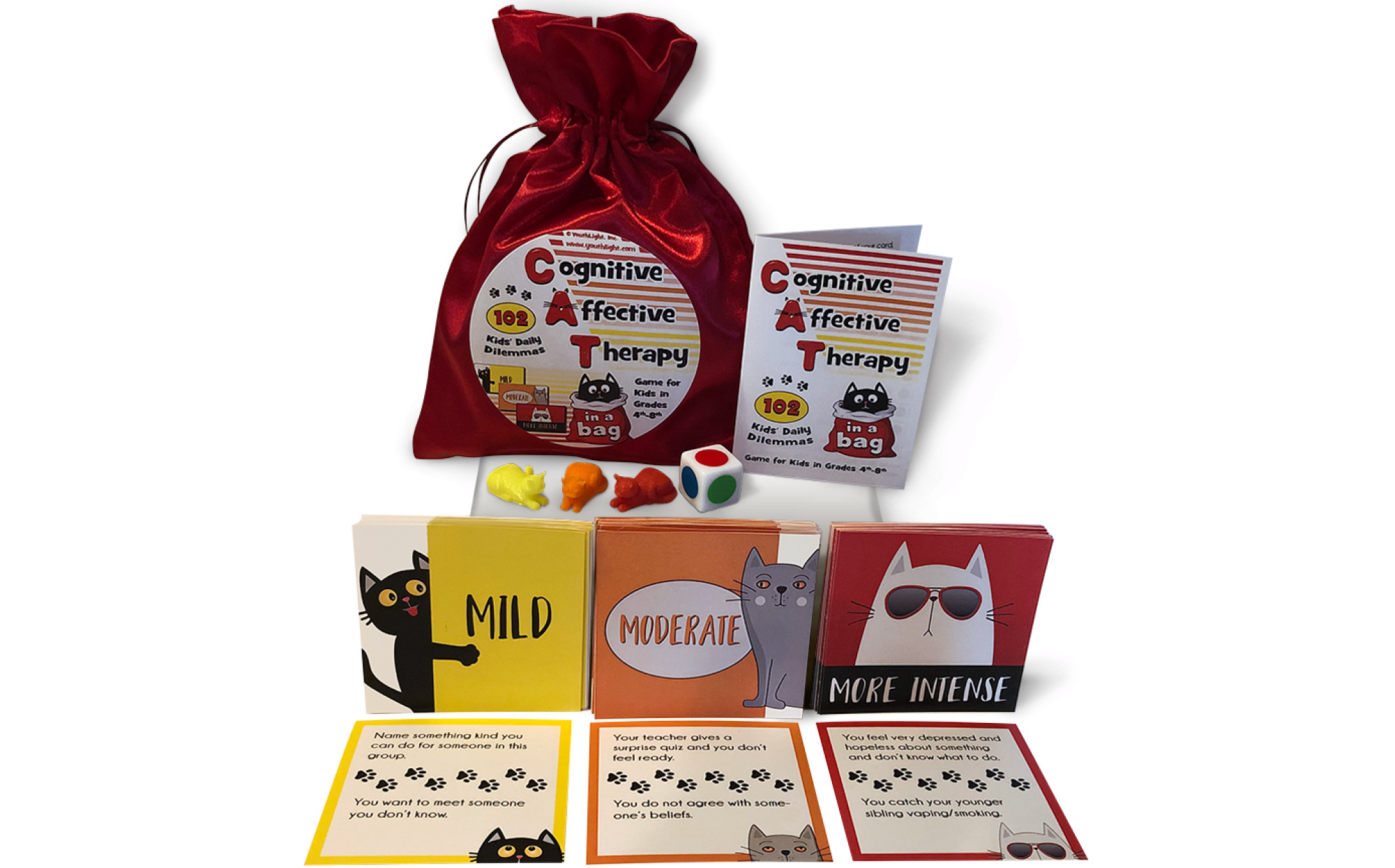 Cognitive Affective Therapy
Cognitive Affective Therapy
 Bounce Back
Bounce Back
 Let's Get Rational
Let's Get Rational
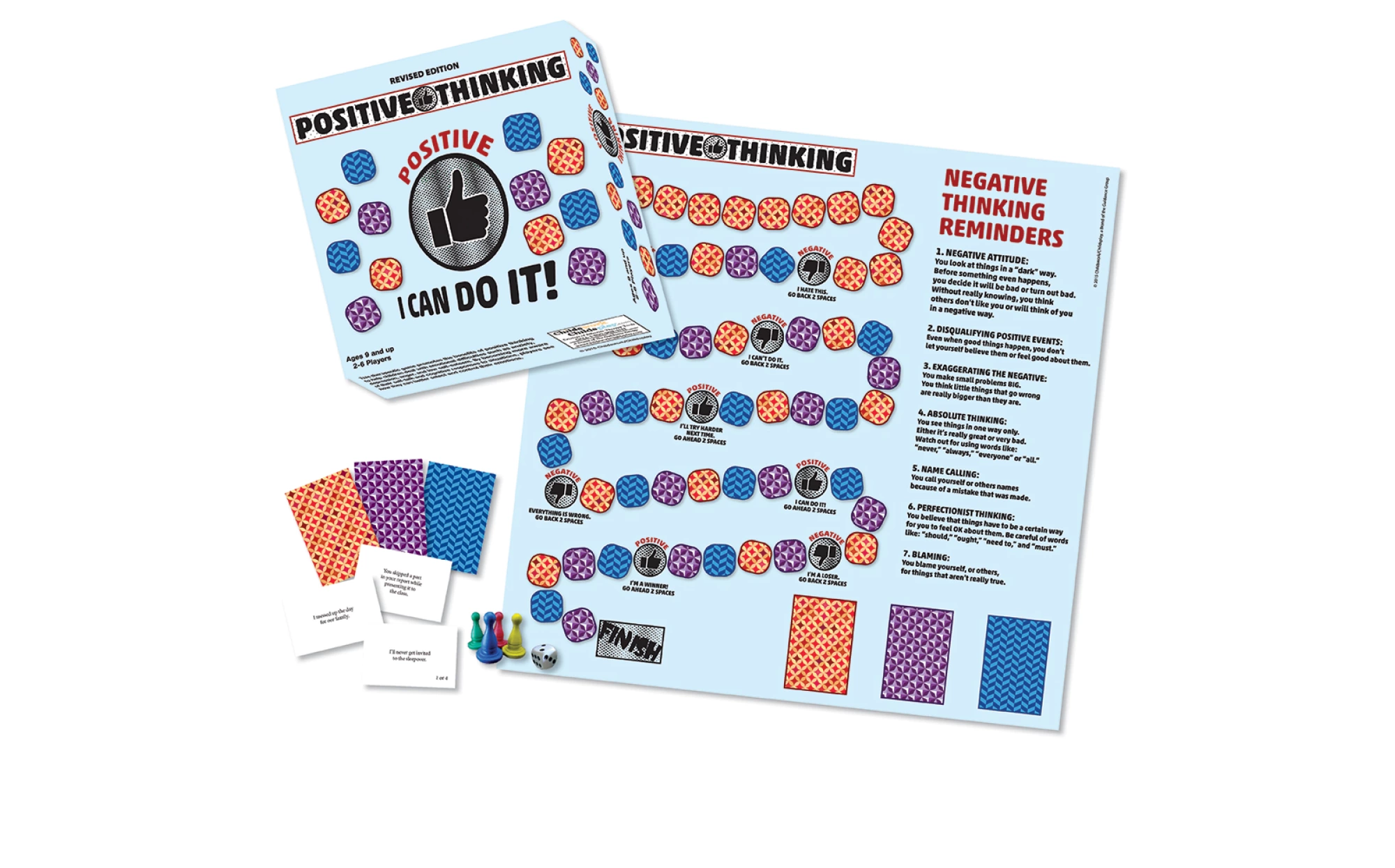 Positive Thinking
Positive Thinking
 The Coping Skills Game
The Coping Skills Game
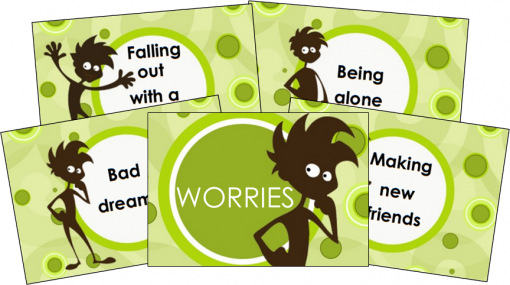 Little Tin of Big Worries
Little Tin of Big Worries
 Rise of the Hero
Rise of the Hero
 Ocean Emotion Seashells
Ocean Emotion Seashells
 Guided Art Therapy Card Deck
Guided Art Therapy Card Deck
 Mood Flip Book
Mood Flip Book
 Between You & Me
Between You & Me
 The Changing Family Game
The Changing Family Game
 Let's Talk About Separation and Divorce
Let's Talk About Separation and Divorce
 My 2 Homes: A Game to Help Kids Understand and Accept Divorce
My 2 Homes: A Game to Help Kids Understand and Accept Divorce
 My Parents Split Up
My Parents Split Up
 Nobody Asked Me!
Nobody Asked Me!
 The Peace Path
The Peace Path
 Splitsville
Splitsville
 The Talking, Feeling, & Doing Divorce Card Game
The Talking, Feeling, & Doing Divorce Card Game
 The Upside Down Divorce Board Game
The Upside Down Divorce Board Game
 Lets Talk About Separation And Divorce
Lets Talk About Separation And Divorce
 Let's Talk Coloring Books
Let's Talk Coloring Books
 Magnetic Dollhouse
Magnetic Dollhouse
 Mix and Match Magnetic Families
Mix and Match Magnetic Families
 Coping Skills For Kids Card Game
Coping Skills For Kids Card Game
 The New Happy Family Game
The New Happy Family Game
 Talking Point Family
Talking Point Family
 Actions & Consequences for Teens Card Game
Actions & Consequences for Teens Card Game
 Equipped for Life Game
Equipped for Life Game
 The Drugs and Alcohol Game
The Drugs and Alcohol Game
 The Relapse Prevention Game
The Relapse Prevention Game
 Recovery the Board Game
Recovery the Board Game
 The New Happy Family Game
The New Happy Family Game
 Blunders
Blunders
 Boom Boom Cards: Kit for a Social Revolution Teen Edition
Boom Boom Cards: Kit for a Social Revolution Teen Edition
 Bounce Back Board Game: Teen Version
Bounce Back Board Game: Teen Version
 Circle of Friends
Circle of Friends
 Common Ties
Common Ties
 Cyber Safe
Cyber Safe
 Friendship Island
Friendship Island
 Intermediate Life Skills Clever Catch Ball
Intermediate Life Skills Clever Catch Ball
 The Helping, Sharing, and Caring Game
The Helping, Sharing, and Caring Game
 Journey to Friendsville
Journey to Friendsville
 Leadership: it's not a game for guppies
Leadership: it's not a game for guppies
 Photo Social Stories Cards About Kids & Their Families Card Game
Photo Social Stories Cards About Kids & Their Families Card Game
 Photo Social Stories Cards About Kids in the Community Card Game
Photo Social Stories Cards About Kids in the Community Card Game
 Puzzled?
Puzzled?
 The Question Challenge Game
The Question Challenge Game
 Sensory Diet Game
Sensory Diet Game
 Smart Sharks Hang in There: RESILIENCE Card Game
Smart Sharks Hang in There: RESILIENCE Card Game
 The Social Conflict Game
The Social Conflict Game
 Social Inferences Fun Deck
Social Inferences Fun Deck
 Social Skills: Boxed set of 6 Board Games
Social Skills: Boxed set of 6 Board Games
 Solution City
Solution City
 Stop, Relax & Think Board Game
Stop, Relax & Think Board Game
 Things People Do
Things People Do
 TopicTalk Conversation Card Game
TopicTalk Conversation Card Game
 What Do You Say... What Do You Do... At Home?
What Do You Say... What Do You Do... At Home?
 What Do You Say...What Do You Do... In the Community?
What Do You Say...What Do You Do... In the Community?
 You And Me
You And Me
 Clever Catch Ball - Life Skills Intermediate
Clever Catch Ball - Life Skills Intermediate
 Clever Catch Ball - Life Skills Primary
Clever Catch Ball - Life Skills Primary
 Let's Talk Coloring Books
Let's Talk Coloring Books
 Problem Solving Photo Scenes
Problem Solving Photo Scenes
 Treasure Chest of Group Activities
Treasure Chest of Group Activities
 Talk About It! Teen Communication Game
Talk About It! Teen Communication Game
 Toss and Learn: Roll and Resolve
Toss and Learn: Roll and Resolve
 Toss and Learn: Give Everyone a Fair Shake
Toss and Learn: Give Everyone a Fair Shake
 Interview Challenge
Interview Challenge
 Career Challenge
Career Challenge
 What's Going On Here? Conversation Cards
What's Going On Here? Conversation Cards
 Health & Safety Conversation Cards
Health & Safety Conversation Cards
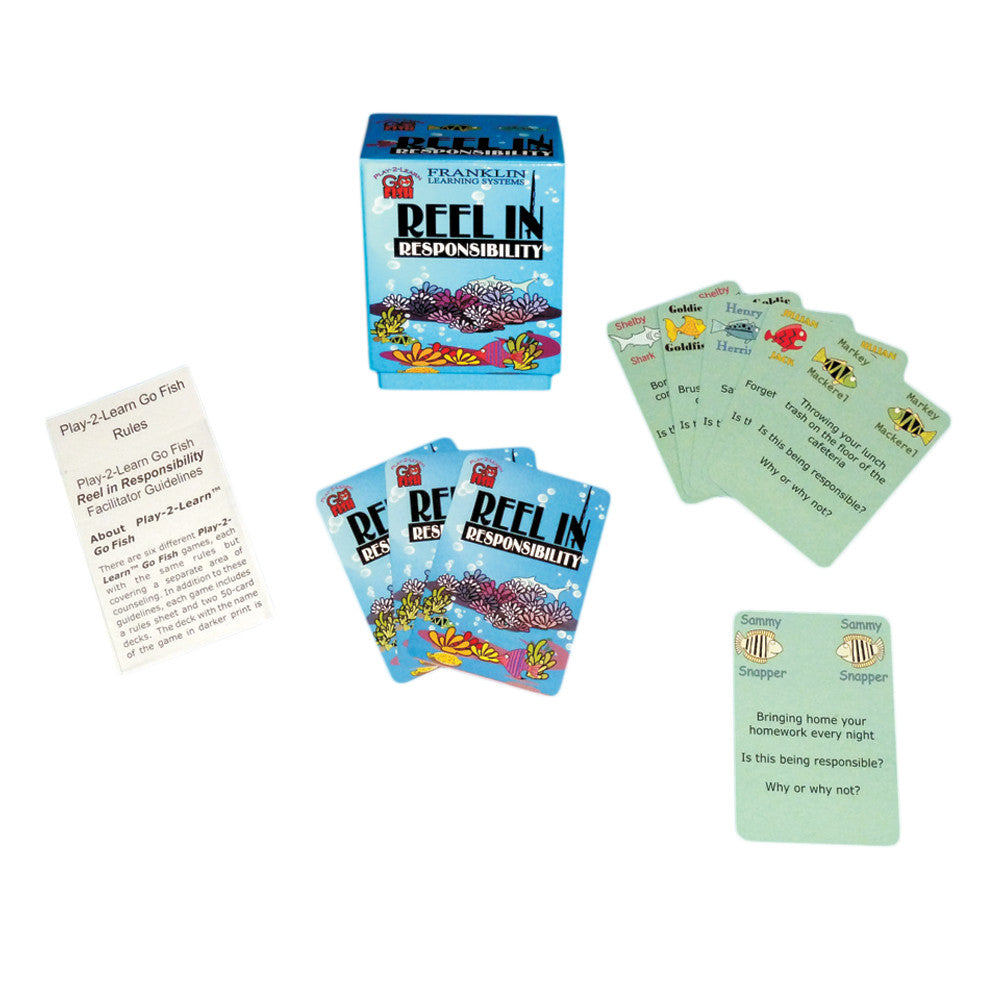 Reel in Responsibility: Play-2-Learn
Reel in Responsibility: Play-2-Learn
 Don't Be Difficult
Don't Be Difficult
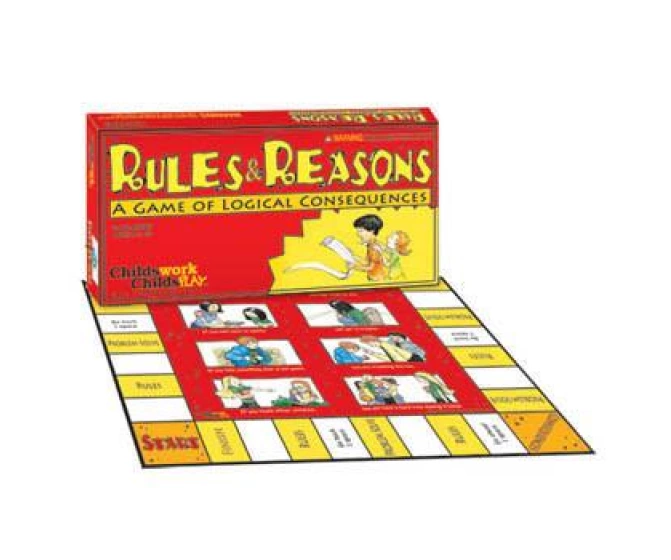 Rules and Reasons
Rules and Reasons
 The Coping Skills Game
The Coping Skills Game
 The Good Mourning Game
The Good Mourning Game
 Photo Feelings Fun Deck
Photo Feelings Fun Deck
 The Saying Goodbye Game
The Saying Goodbye Game
 Coping Skills For Kids Card Game
Coping Skills For Kids Card Game
 Stress Reduction Card Deck
Stress Reduction Card Deck
 The Talking, Feeling, and doing game: The Grief card game
The Talking, Feeling, and doing game: The Grief card game
 The Family Living Game
The Family Living Game
 Magnetic Dollhouse
Magnetic Dollhouse
 Mix and Match Magnetic Families
Mix and Match Magnetic Families
 The New Happy Family Game
The New Happy Family Game
 Any Game Cards
Any Game Cards
 The Dinosaur's Journey to High Self-Esteem
The Dinosaur's Journey to High Self-Esteem
 Dr. PlayWell's Learning Self Control in School
Dr. PlayWell's Learning Self Control in School
 Dr. PlayWell's Think Positive Board Game
Dr. PlayWell's Think Positive Board Game
 Exploring My Self-Esteem
Exploring My Self-Esteem
 Feeling Good
Feeling Good
 The Helping, Sharing, and Caring Game
The Helping, Sharing, and Caring Game
 The Impulse Control Game
The Impulse Control Game
 One of a Kind A Self-Esteem Card Game
One of a Kind A Self-Esteem Card Game
 The Self-Concept Game
The Self-Concept Game
 Self Esteem BINGO! for Adults
Self Esteem BINGO! for Adults
 The Talking, Feeling, & Doing Shyness Card Game
The Talking, Feeling, & Doing Shyness Card Game
 Thumballs: Personal Strengths
Thumballs: Personal Strengths
 Use Your I's
Use Your I's
 Let's Talk Coloring Books
Let's Talk Coloring Books
 Totem - The Feel Good Game
Totem - The Feel Good Game
 CBT 123
CBT 123
 Social-emotional Match-Ups Understanding Myself
Social-emotional Match-Ups Understanding Myself
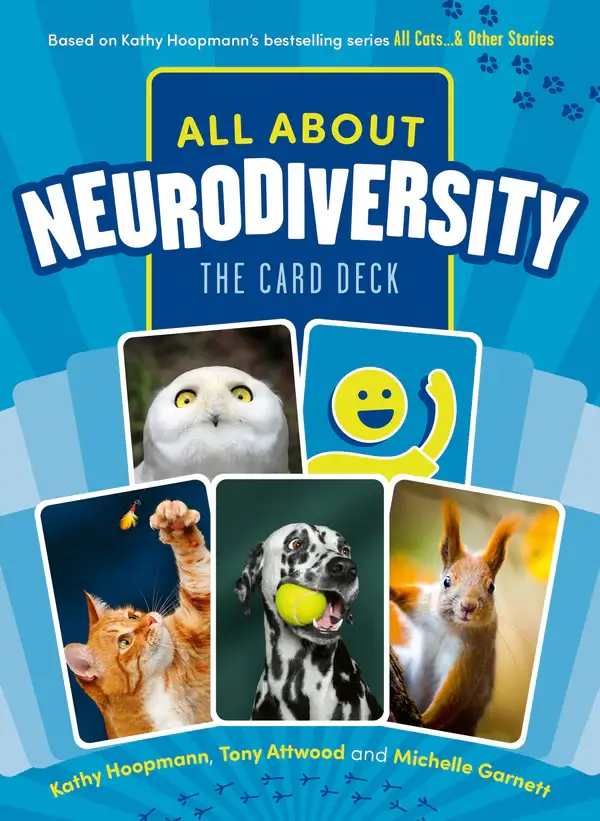 All about Neurodiversity
All about Neurodiversity
 "Let's Make Friends"
"Let's Make Friends"
 Any Game Cards
Any Game Cards
 Best, Worst, First Thumball
Best, Worst, First Thumball
 Blunders
Blunders
 Boundaries Baseball Game
Boundaries Baseball Game
 Caves and Claws
Caves and Claws
 Circle of Friends
Circle of Friends
 Creatures and Critters
Creatures and Critters
 Difficult Situations Fun Deck
Difficult Situations Fun Deck
 Double Trouble A Game of Social Skills
Double Trouble A Game of Social Skills
 Dr Playwell's Game Of Social Success Game
Dr Playwell's Game Of Social Success Game
 Dr. PlayWell's Best Behavior Game
Dr. PlayWell's Best Behavior Game
 Empathy Counts
Empathy Counts
 Expressionary!
Expressionary!
 Figure Me Out
Figure Me Out
 Focus on Manners! Fun Deck
Focus on Manners! Fun Deck
 Great Group Games Cards on the Go: 50 Favorite Team Builders
Great Group Games Cards on the Go: 50 Favorite Team Builders
 The Helping, Sharing, and Caring Game
The Helping, Sharing, and Caring Game
 Icebreaker Thumball
Icebreaker Thumball
 Journey to Friendsville
Journey to Friendsville
 Mumble Jumble
Mumble Jumble
 Operation: Breaking the Boy Code Card Game
Operation: Breaking the Boy Code Card Game
 Operation: Breaking the Girl Code Card Game
Operation: Breaking the Girl Code Card Game
 Photo Social Stories: Kids in School
Photo Social Stories: Kids in School
 Photo Social Story Cards
Photo Social Story Cards
 The Question Challenge Card Game
The Question Challenge Card Game
 The Secret Door
The Secret Door
 The Self-Concept Game
The Self-Concept Game
 The Social Conflict Game
The Social Conflict Game
 Social Skills Chipper Chat
Social Skills Chipper Chat
 The Social Skills Game
The Social Skills Game
 Social Skills: Boxed set of 6 Board Games
Social Skills: Boxed set of 6 Board Games
 Social Smarts
Social Smarts
 Stop the Drama Thumball
Stop the Drama Thumball
 Talk Blocks :Tthe Fun & Practical Way to Communicate
Talk Blocks :Tthe Fun & Practical Way to Communicate
 Talk-It-Out
Talk-It-Out
 The UnGame
The UnGame
 The You & Me Social Skills Card Game
The You & Me Social Skills Card Game
 Thumballs: Personal Strengths
Thumballs: Personal Strengths
 Too Much, Too Little, Just Right
Too Much, Too Little, Just Right
 Webber Photo Cards-Social Issues
Webber Photo Cards-Social Issues
 Webber Pragmatics Playing Cards
Webber Pragmatics Playing Cards
 What Do You Say... What Do You Do... At School?
What Do You Say... What Do You Do... At School?
 What Should Miranda Do?
What Should Miranda Do?
 What's Up? A That's LIFE! Game of Social Language
What's Up? A That's LIFE! Game of Social Language
 Who Are You? Thumball
Who Are You? Thumball
 WHODUNIT
WHODUNIT
 You & Me: A Game That Teaches Social Skills and Social Awareness
You & Me: A Game That Teaches Social Skills and Social Awareness
 Too Close, Too Far, Just Right
Too Close, Too Far, Just Right
 You And Me
You And Me
 Actions and Consequences for Teens
Actions and Consequences for Teens
 Clue Cards: 5 Card Packs to Improve Social Communication
Clue Cards: 5 Card Packs to Improve Social Communication
 Problem Solving Photo Scenes
Problem Solving Photo Scenes
 Social Skills File Folder Games
Social Skills File Folder Games
 Treasure Chest of Group Activities
Treasure Chest of Group Activities
 What the Heck Does That Mean?
What the Heck Does That Mean?
 Social-Emotional Photo Library
Social-Emotional Photo Library
 Coping Skills For Kids Card Game
Coping Skills For Kids Card Game
 Talk About It! Teen Communication Game
Talk About It! Teen Communication Game
 Toss and Learn: Toss Your Anger
Toss and Learn: Toss Your Anger
 Toss and Learn: Give Everyone a Fair Shake
Toss and Learn: Give Everyone a Fair Shake
 What's Going on Here? Conversation Cards
What's Going on Here? Conversation Cards
 How Was Your Day? Conversation Cards
How Was Your Day? Conversation Cards
 Be Kind Cubes
Be Kind Cubes
 Social-emotional Match-Ups Making Good Choices
Social-emotional Match-Ups Making Good Choices
 Social-emotional match-ups Building relationships
Social-emotional match-ups Building relationships
 Grab & Play social-emotional game: Kindness & respect
Grab & Play social-emotional game: Kindness & respect
 Grab & play social-emotional game: Feelings & emotions
Grab & play social-emotional game: Feelings & emotions
 Express your feelings playing cards
Express your feelings playing cards
 Grab & play social-emotional prompts Grades k-2
Grab & play social-emotional prompts Grades k-2
 Grab & play social-emotional prompts Grades 3-5
Grab & play social-emotional prompts Grades 3-5
 Diversity & inclusion Prompt cards
Diversity & inclusion Prompt cards
 Talking Point Kids
Talking Point Kids
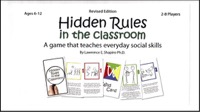 Hidden Rules in the Classroom
Hidden Rules in the Classroom
 The Empathy Game
The Empathy Game
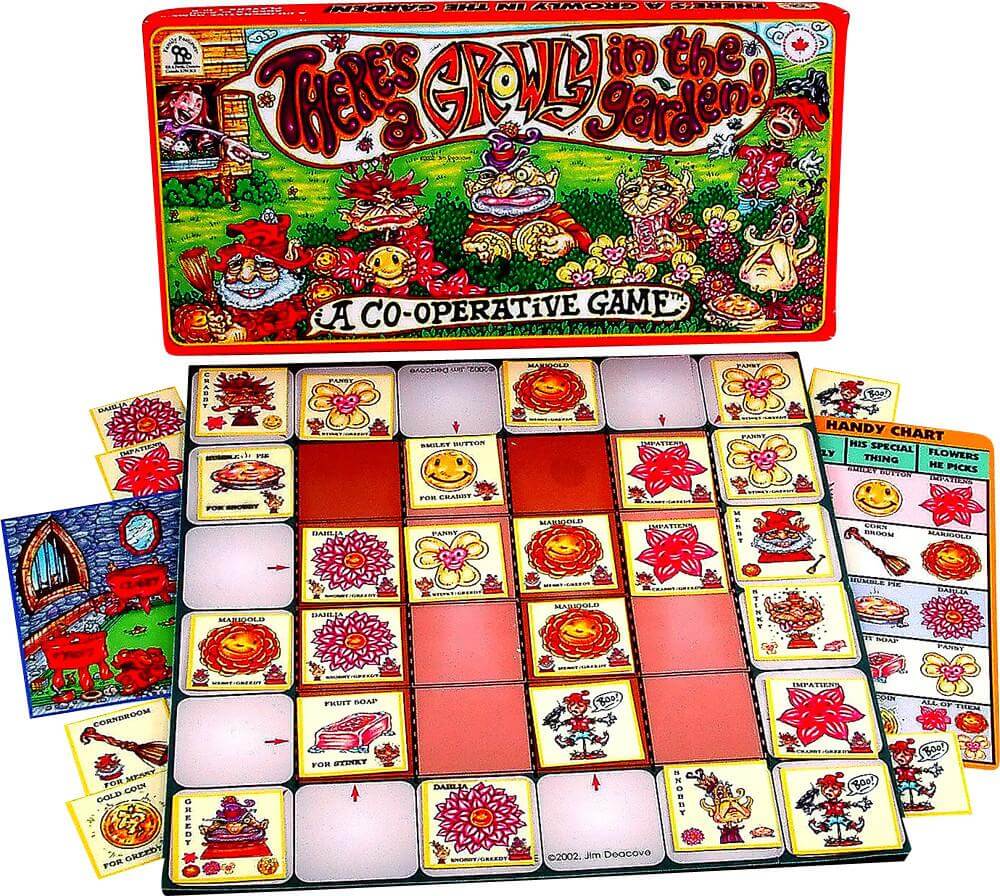 There's a Growly in the Garden!
There's a Growly in the Garden!
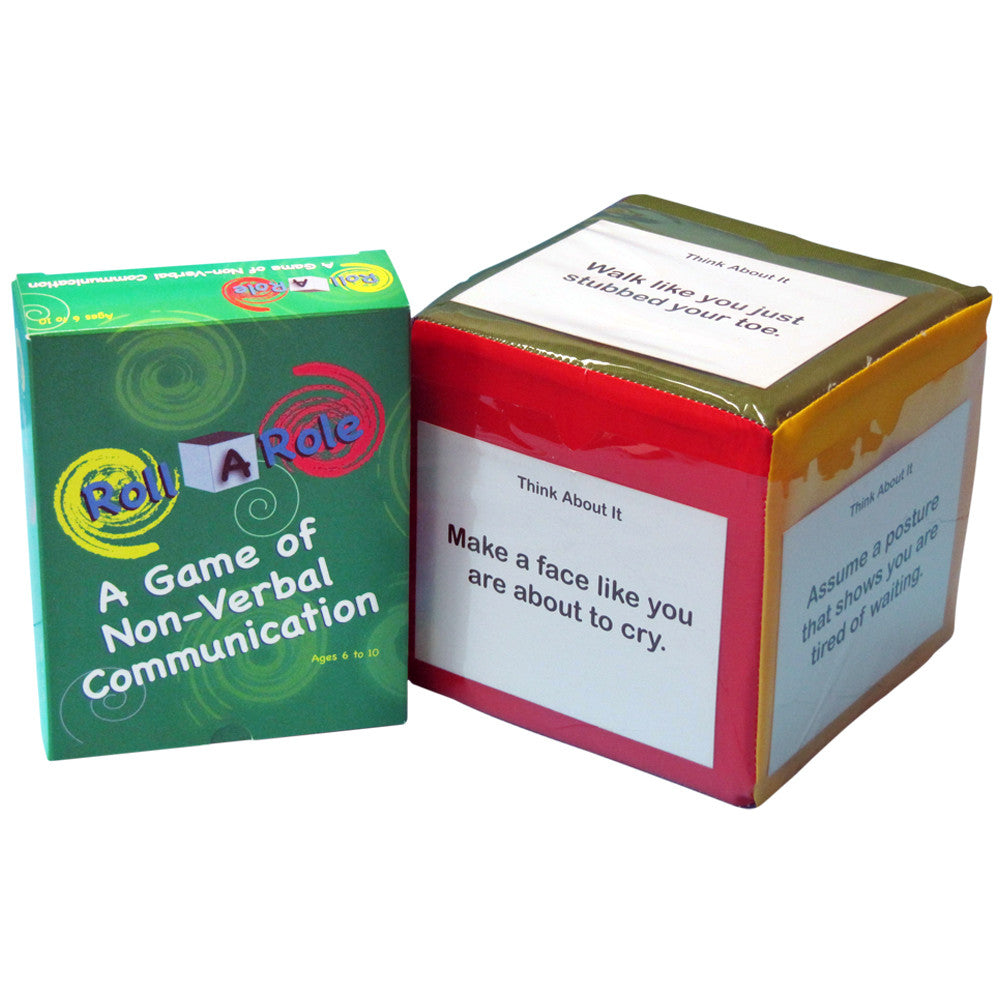 Roll a Role
Roll a Role
 What Should I do Now?
What Should I do Now?
 The Social & Emotional Competence Game
The Social & Emotional Competence Game
 Manners Mall
Manners Mall
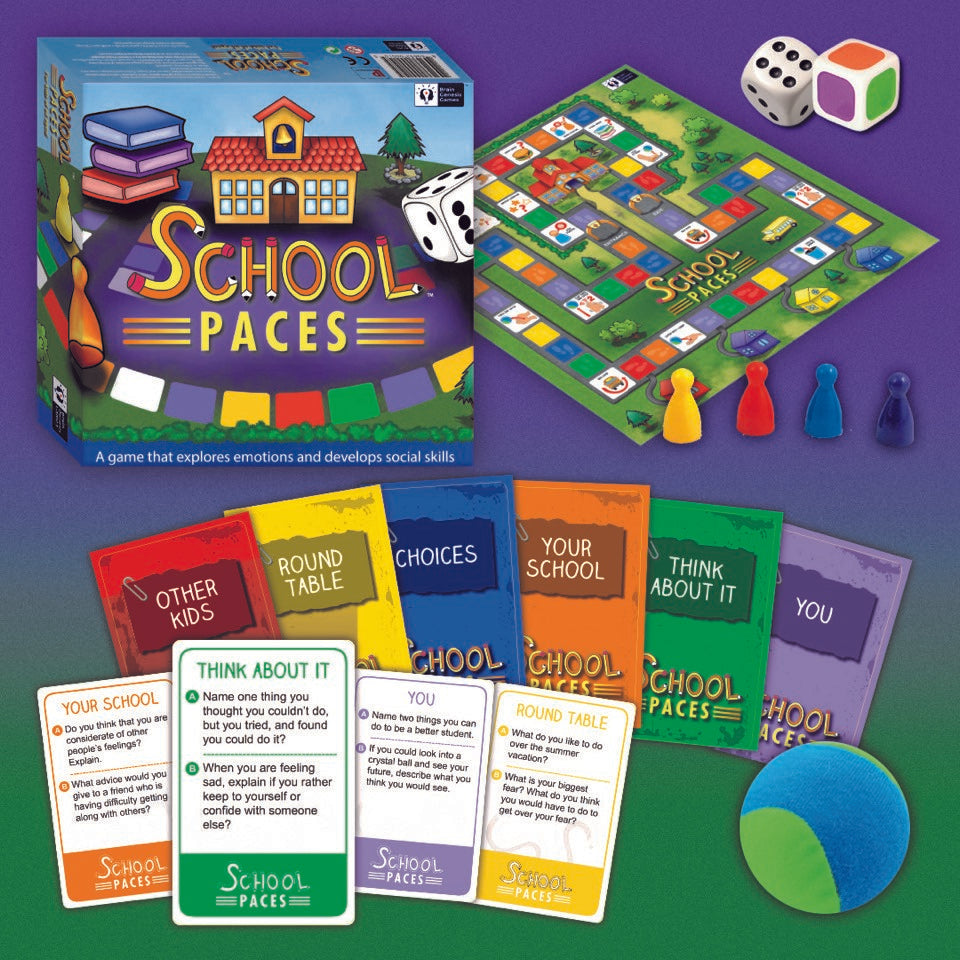 School Paces
School Paces
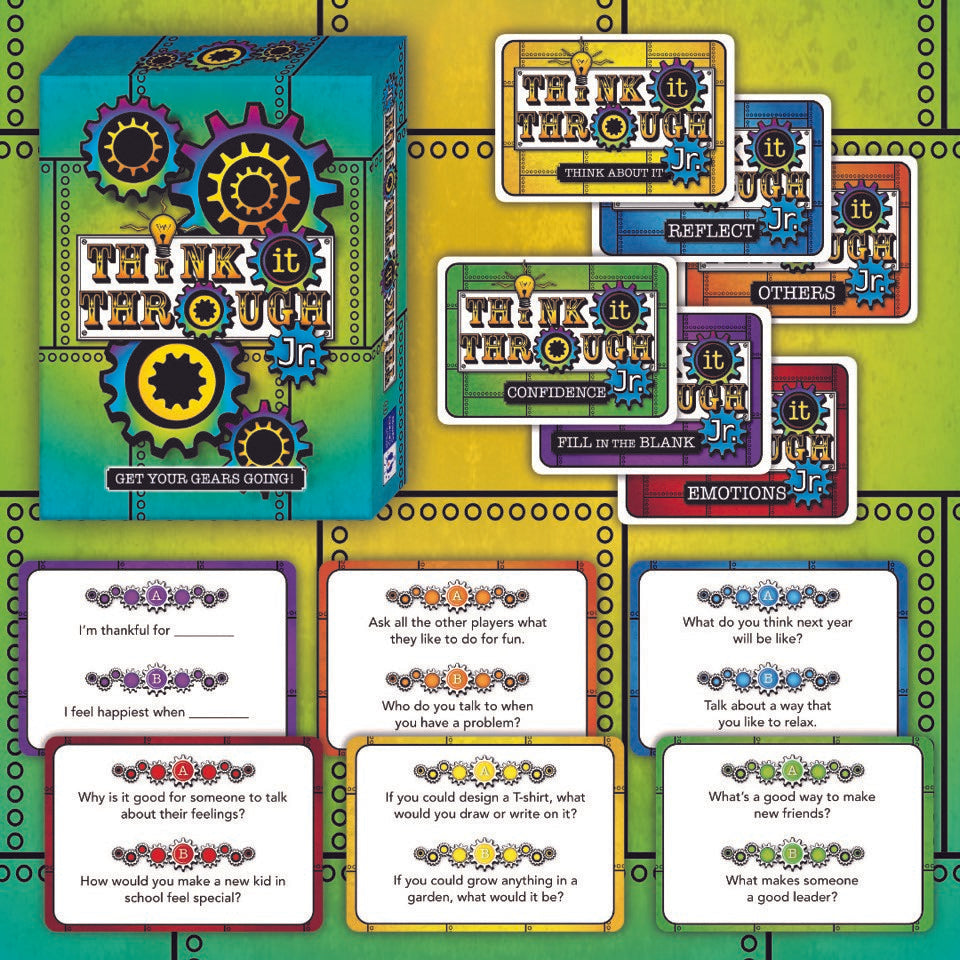 Think It Through Jr.
Think It Through Jr.
 Talking Points Resilience
Talking Points Resilience
 Talking Points Small Talk
Talking Points Small Talk
 52 Essential Relationship Skills
52 Essential Relationship Skills
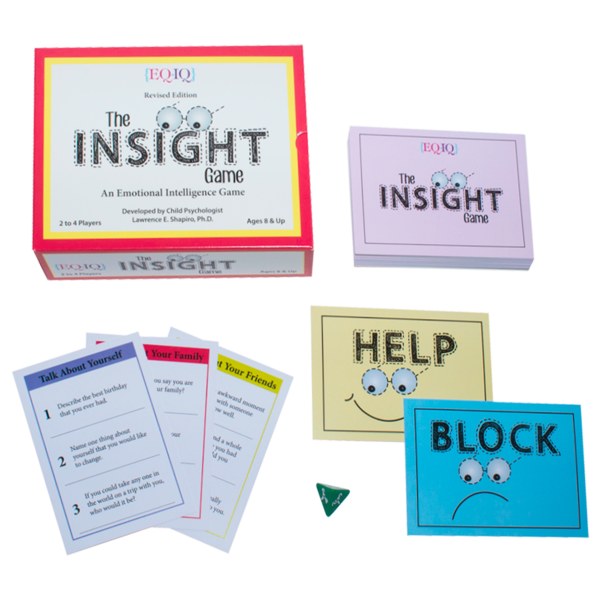 The Insight Game
The Insight Game
 Emotion Cards
Emotion Cards
 Facial Expressions Learning Cards
Facial Expressions Learning Cards
 Feelings Detective
Feelings Detective
 Figure Me Out
Figure Me Out
 MagneTalk Turns & Topic
MagneTalk Turns & Topic
 Original Tangle Therapy
Original Tangle Therapy
 Original Tangle With Texture XL
Original Tangle With Texture XL
 The PowerR Game: Managing Stuttering
The PowerR Game: Managing Stuttering
 Tangle Jr. Fuzzies Set of Two
Tangle Jr. Fuzzies Set of Two
 Tangle Jr. Textured Set of Two
Tangle Jr. Textured Set of Two
 Too Much, Too Little, Just Right
Too Much, Too Little, Just Right
 The Understanding Faces Game
The Understanding Faces Game
 Webber Problem Solving Photo Lotto
Webber Problem Solving Photo Lotto
 What Did You Say? A Game of Non Verbal Language
What Did You Say? A Game of Non Verbal Language
 FOCUS
FOCUS
 Better Builders Emotions
Better Builders Emotions
 What the Heck Does That Mean?
What the Heck Does That Mean?
 Social-Emotional Photo Library
Social-Emotional Photo Library
 Find Your Feelings Emotion Slider
Find Your Feelings Emotion Slider
 Emotion-oes Board Game
Emotion-oes Board Game
 Big feelings pineapple Deluxe set
Big feelings pineapple Deluxe set
 Big feelings Nesting Fruit Friends
Big feelings Nesting Fruit Friends
 All about Neurodiversity
All about Neurodiversity
 White American Contemporary 5-Member Family Set of Dolls
White American Contemporary 5-Member Family Set of Dolls
 Recovery the Board Game
Recovery the Board Game
 Too Close, Too Far, Just Right
Too Close, Too Far, Just Right
 What Do You Know?
What Do You Know?
 Actions & Consequences for Adults Card Game
Actions & Consequences for Adults Card Game
 Actions & Consequences for Teens Card Game
Actions & Consequences for Teens Card Game
 Baby Smarts
Baby Smarts
 Best, Worst, First Thumball
Best, Worst, First Thumball
 The Coping Game
The Coping Game
 Difficult Situations Fun Deck
Difficult Situations Fun Deck
 Dr. Playwell's Coping with Stress Card Game
Dr. Playwell's Coping with Stress Card Game
 Emotional Bingo for Teens
Emotional Bingo for Teens
 Equipped for Life Game
Equipped for Life Game
 Expressionary!
Expressionary!
 From Rage to Reason
From Rage to Reason
 Icebreaker Thumball
Icebreaker Thumball
 Self Esteem BINGO! for Adults
Self Esteem BINGO! for Adults
 Sticks and Stones
Sticks and Stones
 Talk-It-Out
Talk-It-Out
 Teen Sense
Teen Sense
 Emotional Bingo for Children
Emotional Bingo for Children
 Recovery the Board Game
Recovery the Board Game
 Talk It Out
Talk It Out
 Talk About It! Teen Communication Game
Talk About It! Teen Communication Game
 Toss and Learn: Roll for Control
Toss and Learn: Roll for Control
 Career Challenge
Career Challenge
 Interview Challenge
Interview Challenge
 CBT 123
CBT 123
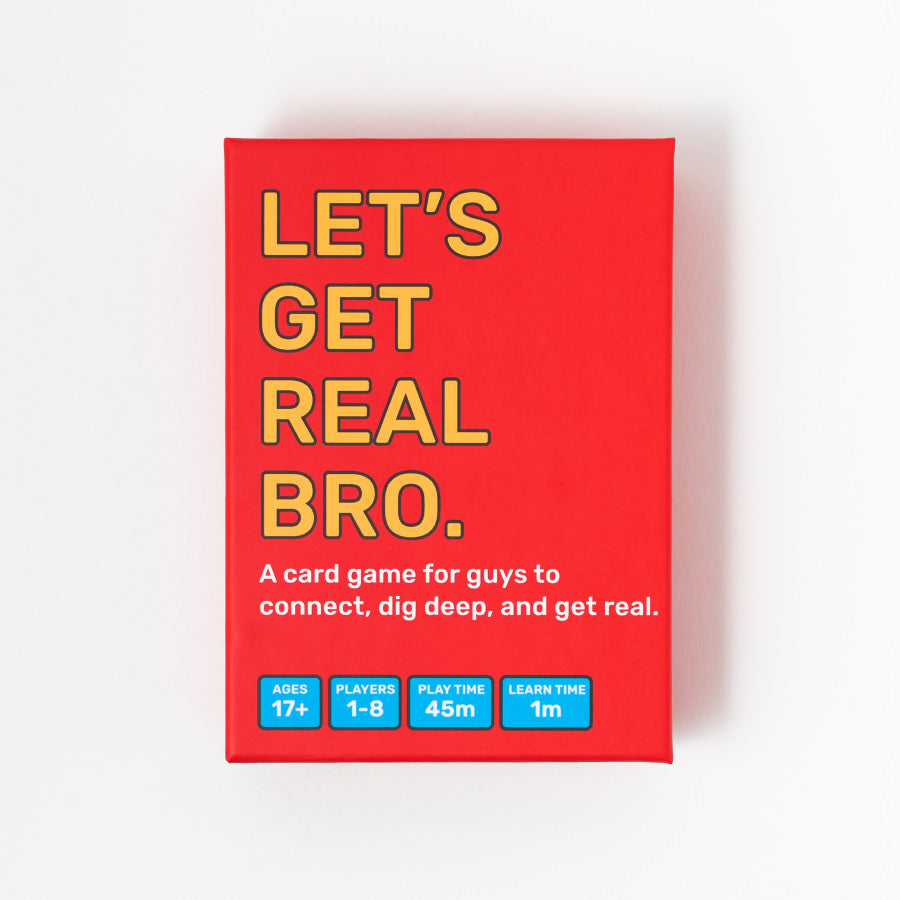 Let's get real bro.
Let's get real bro.
 Talking Point Teens
Talking Point Teens